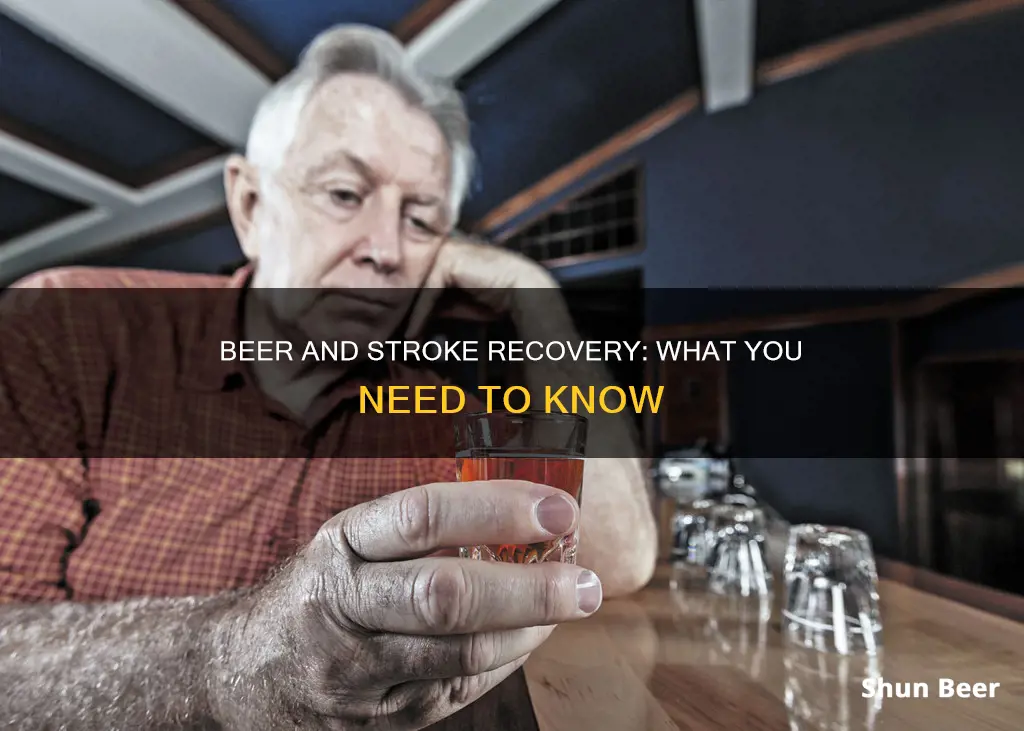
Drinking alcohol is a common social activity, but it can have adverse health effects, including an increased risk of stroke. Alcohol consumption is linked to several conditions that are risk factors for strokes, such as high blood pressure, diabetes, and being overweight. After a stroke, the brain becomes more sensitive to alcohol, and drinking can worsen symptoms like speech problems, fatigue, and mood swings. While it may be possible to drink beer after a stroke, it's important to consult a doctor first and follow their advice on safe drinking limits.
| Characteristics | Values |
|---|---|
| Drinking alcohol after a stroke | Not recommended |
| Alcohol's effect on stroke survivors | Increased vulnerability to adverse effects of alcohol abuse, including cognitive problems impacting memory, mobility, and speech, as well as worsening depression and other mental health conditions |
| Alcohol's interaction with medication | May trigger side effects and interfere with medications, especially blood-thinning medicines such as warfarin |
| Safe drinking guidelines | Consult a doctor for personalised advice; generally, men and women should have no more than two standard drinks per day and no more than four standard drinks on any one occasion |
| Alcohol's impact on health | Contributes to high blood pressure, diabetes, weight gain, and atrial fibrillation, all of which are risk factors for stroke |
What You'll Learn
- Alcohol increases the risk of stroke by contributing to high blood pressure
- Drinking alcohol after a stroke can cause a subsequent stroke
- Alcohol can interfere with medication, especially blood-thinning drugs
- Alcohol can worsen depression and other mental health issues post-stroke
- Drinking guidelines for stroke survivors

Alcohol increases the risk of stroke by contributing to high blood pressure
Drinking above the recommended limit increases your risk of stroke and can also affect your recovery and well-being. Alcohol is linked to a number of conditions that are risk factors for stroke.
High blood pressure is the most important risk factor for stroke, contributing to around half of all strokes in the UK. Drinking too much alcohol raises your blood pressure and can lead to damage to your circulatory system, increasing your risk of stroke. This is because alcohol can cause your blood vessels to constrict, increasing the force required for blood to flow through them. Over time, this can lead to a thickening of the blood vessel walls, further impeding blood flow and increasing blood pressure.
In addition to high blood pressure, alcohol can also increase your risk of developing other conditions that are risk factors for stroke. These include atrial fibrillation, a type of irregular heartbeat, and type 2 diabetes, which is linked to an increased risk of stroke. Alcoholic drinks tend to be very high in calories, so regularly drinking large amounts can also make it more difficult to maintain a healthy weight, and being overweight is another risk factor for stroke.
If you have had a stroke or transient ischaemic attack (TIA or mini-stroke), it is important to seek individual advice about alcohol consumption from a medical professional. While it may be safe to drink in moderation, sticking within the guidelines for safe levels of drinking is crucial.
Beer Traps: Effective Earwig Control or Urban Myth?
You may want to see also

Drinking alcohol after a stroke can cause a subsequent stroke
Drinking alcohol can increase your risk of having a stroke, and this risk rises with the amount of alcohol consumed. This means that drinking alcohol after a stroke can cause a subsequent stroke.
Excessive alcohol consumption can lead to hypertension, which is a direct contributor to strokes. Alcohol can also cause certain heart problems that increase the likelihood of a stroke, such as atrial fibrillation and cardiomyopathy. Additionally, alcohol can inhibit coagulation, which has been linked to hemorrhagic strokes. On the other hand, this same coagulation effect seems to offer some protection against ischemic strokes when alcohol is consumed in moderation. Alcohol can also raise HDL ("good") cholesterol, which is associated with a reduced risk of stroke.
However, the protective effects of moderate drinking are outweighed by the increased risk of stroke associated with excessive alcohol intake. A study published in The Lancet involving 160,000 Chinese adults found that moderate drinking did not protect against strokes but instead increased the risk compared to abstaining from alcohol. In this study, alcohol contributed to 8% of all strokes caused by a clot in the brain and 16% of bleeding strokes.
Therefore, it is important for individuals who have had a stroke to carefully consider their alcohol consumption. While complete abstinence may not be necessary, sticking within recommended guidelines on drinking is crucial. Doctors can provide individual advice and guidance on whether and how much alcohol can be safely consumed after a stroke.
Afib and Alcohol: Is Drinking Beer Safe?
You may want to see also

Alcohol can interfere with medication, especially blood-thinning drugs
Drinking alcohol after a stroke is not recommended, as it can increase your risk of having another stroke. Alcohol can also worsen any changes to your speech, thinking, vision, and balance caused by the stroke. If you are experiencing fatigue post-stroke, alcohol may exacerbate this.
However, if you do choose to consume alcohol, it is important to be aware that alcohol can interfere with medication, especially blood-thinning drugs. Blood thinners, also known as anticoagulants, are medications that prevent blood clots from forming. They are often prescribed to people with atrial fibrillation, a heart condition that causes an irregular heartbeat.
- Increased Bleeding Risk: Both alcohol and blood thinners are natural blood thinners and contribute to reducing the blood's ability to clot. When combined, they amplify this effect, increasing the risk of bleeding, even from minor injuries or cuts.
- Liver Function Interference: Alcohol and many blood thinners are processed by the liver. Drinking alcohol while taking blood thinners can strain the liver, potentially impacting its ability to metabolize medications effectively, resulting in unpredictable variations in drug levels in the body.
- Medication Effectiveness: Alcohol can interfere with the absorption and metabolism of blood-thinning medications. This interference may impact the intended therapeutic effects, rendering the medication less effective in preventing blood clots. For individuals taking warfarin, alcohol consumption can elevate INR (International Normalized Ratio) levels, indicating a higher risk of bleeding. Maintaining stable INR levels is crucial for the safe use of warfarin.
- Altered Medication Dosage: Alcohol can alter the time it takes for your body to break down blood-thinning medication, potentially affecting its efficacy and dosage requirements.
- Heightened Side Effects: Combining alcohol with blood thinners can increase the risk of side effects, such as gastrointestinal bleeding, nausea, vomiting, heartburn, and stomach ulcers.
- Compromised Decision-Making: Alcohol impairs judgment and coordination. When combined with blood thinners, which also affect clotting and bleeding, impaired judgment may increase the likelihood of accidents or injuries.
It is important to consult your doctor or pharmacist before consuming alcohol while taking any medication, especially blood thinners, to ensure your safety and avoid adverse interactions.
The Beer Fridge: How Does It Work?
You may want to see also

Alcohol can worsen depression and other mental health issues post-stroke
Alcohol can have a significant impact on mental health, particularly for those who have experienced a stroke. While moderate drinking is often associated with social occasions and celebrations, excessive alcohol consumption can worsen depression and other mental health issues post-stroke.
Firstly, alcohol can interfere with medications commonly prescribed after a stroke, such as warfarin, a blood-thinning medication. Mixing alcohol with certain medications can have harmful interactions, affecting their efficacy and increasing the risk of side effects. This can negatively impact an individual's physical health, exacerbating feelings of depression and anxiety related to stroke recovery.
Secondly, alcohol can increase the risk of another stroke occurring. High blood pressure, atrial fibrillation, weight gain, and uncontrolled diabetes are all linked to excessive alcohol consumption and are risk factors for having another stroke. The fear of experiencing another stroke can heighten anxiety and depression, affecting an individual's overall mental well-being.
Additionally, alcohol can worsen the cognitive and physical effects of a stroke. It can amplify changes in speech, thinking, vision, and balance, as well as increase fatigue. These impairments can contribute to feelings of depression, anxiety, and a loss of confidence, particularly if they hinder an individual's ability to participate in activities they once enjoyed or impact their independence.
Furthermore, alcohol itself can act as a depressant on the central nervous system. It can disrupt the balance of neurotransmitters in the brain, affecting mood and emotion regulation. This can lead to or worsen existing mental health conditions such as depression, anxiety, and mood disorders.
It is important to note that the impact of alcohol on mental health is complex and varies from person to person. While some individuals may experience worsened mental health after reducing their alcohol consumption, this is typically a temporary effect during the withdrawal phase. Seeking professional support and guidance during this time is crucial. In the long term, reducing alcohol intake can lead to improved mental well-being and a lower risk of stroke-related complications.
Beer Transfer Mechanics: How Does It Work?
You may want to see also

Drinking guidelines for stroke survivors
If you have had a stroke, it is important to consult your doctor about drinking alcohol. They can advise you on whether it is safe for you to drink, how much you can drink, and when you can start drinking again. Your doctor will consider your individual circumstances, including your medication, to determine the impact of alcohol on your health. It is crucial to follow their recommendations to reduce the risk of another stroke and ensure a safe recovery.
Alcohol's impact on stroke survivors
Alcohol can have several negative effects on stroke survivors. Firstly, it can increase the risk of having another stroke by contributing to various conditions that are risk factors, such as high blood pressure, type 2 diabetes, and being overweight. Alcoholic drinks are high in calories and can lead to weight gain, which is another risk factor for stroke. Additionally, alcohol can trigger or worsen certain health conditions, such as atrial fibrillation, a type of irregular heartbeat linked to an increased risk of stroke.
Secondly, alcohol can interfere with medications commonly taken by stroke survivors, such as blood-thinning medications like warfarin. Drinking while taking these medications can increase the risk of bleeding and cause side effects such as headaches and dizziness. It is crucial to consult your doctor or pharmacist to understand how alcohol may interact with your specific medications.
Thirdly, alcohol can exacerbate the negative effects of a stroke. It can worsen symptoms such as poor balance, speech problems, and fatigue. Alcohol can also negatively impact mood swings and depression, which are common after a stroke, and affect memory and thinking. Additionally, alcohol can cause dehydration, making headaches worse. Therefore, it is important for stroke survivors to be cautious about drinking alcohol and to follow the recommended guidelines.
Guidelines for safe drinking
To reduce the risk of harm from alcohol, it is important to drink within the recommended limits. According to the Australian Guidelines, healthy men and women should consume no more than 10 standard drinks per week and no more than 4 standard drinks on any one day. However, it is important to note that these guidelines are for healthy individuals, and stroke survivors should consult their doctor to determine their safe limits.
To monitor your alcohol intake, it is helpful to keep a drinks diary. Write down how many drinks you have each day and calculate the total number of units consumed. This will help you stay within the recommended limits and identify if you need to cut down. Additionally, you can try practical tips such as setting a daily alcohol limit, drinking slowly, alternating alcoholic drinks with water or soft drinks, and avoiding buying rounds in a group setting.
In summary, while it may be possible for stroke survivors to drink alcohol, it is important to consult a doctor or medical professional for individual advice. They will consider your specific circumstances and provide guidance on safe drinking limits. By following their recommendations and adhering to guidelines for safe drinking, you can reduce the risk of another stroke and support your recovery.
The Magic Inside Beer Cartridges: How Do They Work?
You may want to see also
Frequently asked questions
It is not recommended to drink alcohol after a stroke as it can increase your risk of having another stroke. Alcohol can also worsen the negative effects of a stroke, such as poor balance, speech problems, and mood swings. It is best to consult your doctor, who can advise you on whether and when it is safe for you to drink alcohol.
Alcohol contributes to several conditions that are risk factors for stroke, including high blood pressure, type 2 diabetes, and being overweight. Alcoholic drinks also contain a high number of calories and can lead to weight gain, which is another risk factor for stroke.
After a stroke, the brain can become more sensitive to the effects of alcohol, which can cause cognitive problems impacting memory, mobility, and speech. Alcohol can also worsen fatigue and make it more difficult to recover from the stroke.







